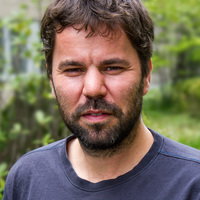
Wangui Kimari
Related Authors
Denielle Elliott
York University
Megan Price
Netherlands Institute of International Relations 'Clingendael'
Francesco Colona
University of Amsterdam
Peter Albrecht
Danish Institute For International Studies
Logan Cochrane
Hamad Bin Khalifa University
Samar Al-Bulushi
University of California, Irvine
Amanda Pinheiro de Oliveira
University of California, Santa Barbara
InterestsView All (20)










Uploads
Papers by Wangui Kimari
Nairobi use a vernacular that I term war-talk. This is a speech,
anchored in the Swahili derived urban slang language Sheng,
which includes words that reference combat situations. If Sheng,
as has been argued, is a generational articulation of unequal
spatialized relations in Nairobi, war-talk further indexes the siege
that those who live within the margins of the city experience
every day, and that appears to be worsening. In addition, I put
forward that war-talk is shaped by specific situated identities
taken up in the East of Nairobi, subjectivities that chronicle what
are seen as ongoing violations of the poor, particularly by the
police. At the same time, while it bears witness to “war,” war-talk
does not position its speakers solely as victims, and is performed
as a language that offers deft situated escapes that portend
vernacular and material agency for those who continue to be its
progenitors in the margins of this city.
a transnational conversation on what the contemporary status of
urban rivers can tell us about the endurance of coloniality in these
two spaces. Against the hegemonic bids for their “revitalization,” we
attend to these two rivers, both of which helped propel the growth of
their respective urban agglomerations, as symbols of people-centered
struggles for abolition ecologies. We aim to provoke the incorporation
of more plural understandings and narrations within the
discipline of geography, and have been struck by the similarities across
different post- and settler-colonial contexts, and, as well, the limited
lenses that attend to these environments in academic scholarship.
Accordingly, we also highlight the possibilities that emerge in thinking
jointly with urban spaces across the “North” and “South” divide, in
order to demonstrate the connected and pervasive nature of empire,
and the variegated practices that resist coloniality in cities.
in Mathare, Nairobi, I show how the continuities of an
imperial planning become territorialized in a water pump in this
“slum.” These events highlight the assembling of empire through
ideas and practices for politics, ecology, economics and society that
produce the city of Nairobi in the longue durée. Notwithstanding
the persistence of a “divide and rule” spatial management, I show
here how residents of poor spaces struggle for possibilities, however
tragic. In dwelling in their stories, this paper argues that
Nairobi's coloniality persists and principally in these ecologies of
exclusion. The most visible imperial novelty, however, is that the
police are used more frequently to enforce city divisions, becoming
de facto urban managers and infrastructure. Against the reinstantiations
of empire, I argue that the material and enunciatory struggles
of slum residents potentiates fugitive possibilities for Nairobi as
a whole.
Fieldwork in Mathare, Korogocho and Kangemi provided insights into how settlement residents must rely upon their social networks and personal attributes to ensure access to a combination of
protective communities. Unable to call upon the state as the guarantor of public welfare, citizens must ‘hustle for security’, using their wits and their networks to assemble a tenuous patchwork of protection. The research identifed not only the risks this creates for individuals and communities, but also how the propensity to resort to individualised security strategies can undermine the notion and the actualisation of ‘the public good’.
The paper concludes with proposals for addressing the more malign aspects of plural security provision, specifcally, the need to curtail the providers’ power and to work towards consolidating various providers under uniform rubrics of oversight and performance standards. The paper contributes to a comparative research project on plural security in urban settings that draws upon empirical insights from case studies in Beirut, Nairobi, and Tunis.
Nairobi use a vernacular that I term war-talk. This is a speech,
anchored in the Swahili derived urban slang language Sheng,
which includes words that reference combat situations. If Sheng,
as has been argued, is a generational articulation of unequal
spatialized relations in Nairobi, war-talk further indexes the siege
that those who live within the margins of the city experience
every day, and that appears to be worsening. In addition, I put
forward that war-talk is shaped by specific situated identities
taken up in the East of Nairobi, subjectivities that chronicle what
are seen as ongoing violations of the poor, particularly by the
police. At the same time, while it bears witness to “war,” war-talk
does not position its speakers solely as victims, and is performed
as a language that offers deft situated escapes that portend
vernacular and material agency for those who continue to be its
progenitors in the margins of this city.
a transnational conversation on what the contemporary status of
urban rivers can tell us about the endurance of coloniality in these
two spaces. Against the hegemonic bids for their “revitalization,” we
attend to these two rivers, both of which helped propel the growth of
their respective urban agglomerations, as symbols of people-centered
struggles for abolition ecologies. We aim to provoke the incorporation
of more plural understandings and narrations within the
discipline of geography, and have been struck by the similarities across
different post- and settler-colonial contexts, and, as well, the limited
lenses that attend to these environments in academic scholarship.
Accordingly, we also highlight the possibilities that emerge in thinking
jointly with urban spaces across the “North” and “South” divide, in
order to demonstrate the connected and pervasive nature of empire,
and the variegated practices that resist coloniality in cities.
in Mathare, Nairobi, I show how the continuities of an
imperial planning become territorialized in a water pump in this
“slum.” These events highlight the assembling of empire through
ideas and practices for politics, ecology, economics and society that
produce the city of Nairobi in the longue durée. Notwithstanding
the persistence of a “divide and rule” spatial management, I show
here how residents of poor spaces struggle for possibilities, however
tragic. In dwelling in their stories, this paper argues that
Nairobi's coloniality persists and principally in these ecologies of
exclusion. The most visible imperial novelty, however, is that the
police are used more frequently to enforce city divisions, becoming
de facto urban managers and infrastructure. Against the reinstantiations
of empire, I argue that the material and enunciatory struggles
of slum residents potentiates fugitive possibilities for Nairobi as
a whole.
Fieldwork in Mathare, Korogocho and Kangemi provided insights into how settlement residents must rely upon their social networks and personal attributes to ensure access to a combination of
protective communities. Unable to call upon the state as the guarantor of public welfare, citizens must ‘hustle for security’, using their wits and their networks to assemble a tenuous patchwork of protection. The research identifed not only the risks this creates for individuals and communities, but also how the propensity to resort to individualised security strategies can undermine the notion and the actualisation of ‘the public good’.
The paper concludes with proposals for addressing the more malign aspects of plural security provision, specifcally, the need to curtail the providers’ power and to work towards consolidating various providers under uniform rubrics of oversight and performance standards. The paper contributes to a comparative research project on plural security in urban settings that draws upon empirical insights from case studies in Beirut, Nairobi, and Tunis.